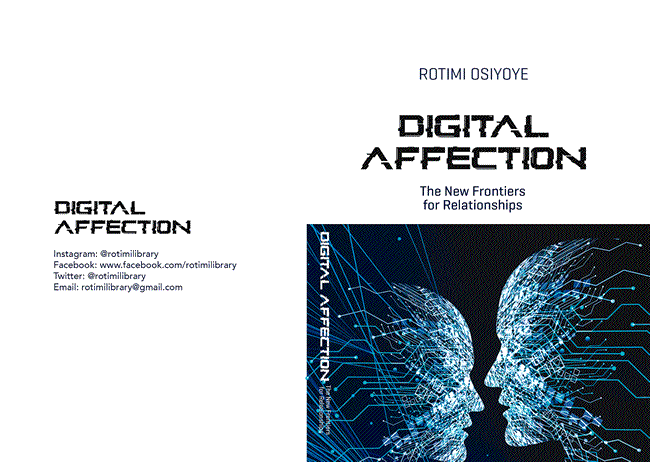By OYELOLA OLUWADAMILARE
A review of Rotimi Osiyoye’s Digital Affection: New Frontiers for Relationships by OYELOLA OLUWADAMILARE.
NOT many books have given insight into the differences and impacts modern technology has introduced into human endeavours in relationships like the 292-page ‘Digital Affection.’
It explains in detail the pros and cons of relationships in the digital age without neglecting how social relations and human cordiality existed before now.
The author, Rotimi Osiyoye, highlighted the barriers in relationships encountered in the past. Human connections and interactions are limited with various factors ranging from distance to limited channels of communication.
The writer narrates the events of intimacy and courting amongst two lovers in the past when there were no modern technologies and smart devices compared to how affairs and relationships play out now that we have almost all of these modern devices, mediums and advancements in technologies.
Osiyoye explains the paradigm shift as regards feelings, love and intimate affections. In this book, Digital Affections, the psychology of human-to-human relationships in modern time is thoroughly explained: analyzing the merits and demerits. Take, for instance, the method in which information was exchanged in time past. It took a long time for a receiver to get any message from his or her sender and vice-versa; this causes tension and anxiety in the waiting period, unlike now that both the receiver and the sender enjoy real-time plugins and responses.
Digital Affections captures the unavailability of firsthand information in the past and the hindrances that come with it. Osiyoye details how lovers of time past exchanged love and affections with little or no intimate moments caused by distance and lack of the digital means to seamlessly connect as it is in this age and time.
The writer is not oblivious of the disadvantages that come with too much access to information due to easy connectivity and communication channels but created an objective balance regarding the advantages enjoyed by the millennial. One of the distinct factors that distinguish the old era of human communication and relationship as compared to the modern-day digital evolution described in “Digital Affections” is the fact that technology has reduced tension and anxiety. People are much more able to leverage knowledgeable information and digital content to improve their social capital.
The author mastered the art of relatable storytelling to drive his salient point into the reader’s mind; he maintains momentum with utmost attention to details that distinguish both eras of human social interactions/relationships.
Digital Affections adeptly describes the variables that come with the advent of modern-day technology, thereby changing the usual narrative of human connections, social values and love in its entire essence.
In this book published by Out of Sight Hub, the author touches on various human endeavours aside from discussing the context of love and its affections. Osiyoye shares how technology has helped relationships transcend culture and religion, hence building on social interactions and increased interpersonal connections.
The writer painstakingly analyses the functionality of various social media channels, apps, and algorithm codes. One of the chapters also elaborates on the scientific predictions of human relationships with robotics and the eventual progression of our daily lives in the nearest future.
Osiyoye’s vast knowledge towards creating this masterpiece stems from the fact that he was old enough to interact and establish relationships in the past as much as he’s not too old to decipher modern-day modes, lifestyles and inventions. Just like he mentioned in his book, if the people of old were able to peep into the future, they would have spent so much time creating an elixir that will keep them alive to experience the unique momentum in technology and digital evolution. You can rest assured that “Digital Affection” will provoke your thoughts and reveal the fundamentals of the new frontiers in relationships.






